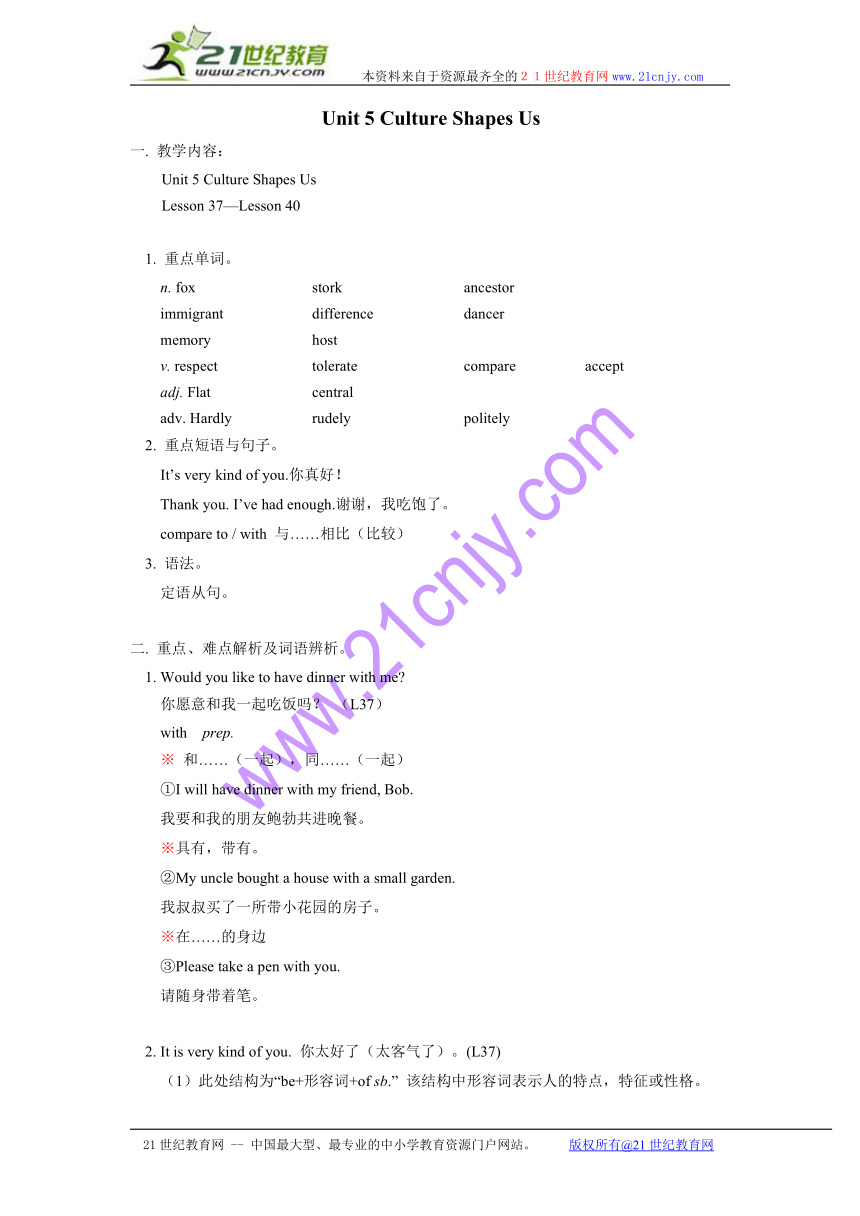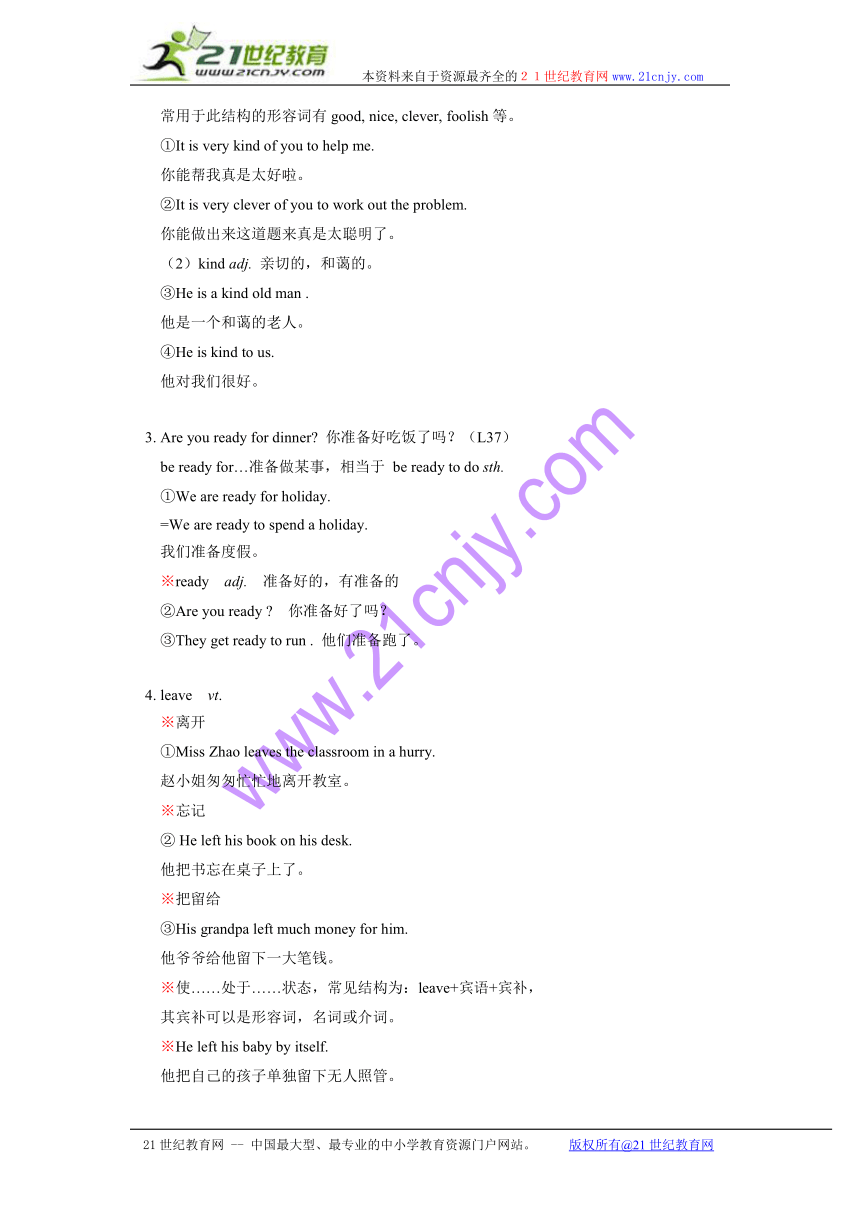冀教版英语重难点解析:九年级下Unit 5 Culture shapes us Lesson 37-Lesson 40
文档属性
| 名称 | 冀教版英语重难点解析:九年级下Unit 5 Culture shapes us Lesson 37-Lesson 40 |

|
|
| 格式 | rar | ||
| 文件大小 | 15.1KB | ||
| 资源类型 | 教案 | ||
| 版本资源 | 冀教版 | ||
| 科目 | 英语 | ||
| 更新时间 | 2013-08-24 00:00:00 | ||
图片预览


文档简介
本资料来自于资源最齐全的21世纪教育网www.21cnjy.com
Unit 5 Culture Shapes Us
一. 教学内容:
Unit 5 Culture Shapes Us
Lesson 37—Lesson 40
1. 重点单词。
n. fox stork ancestor
immigrant difference dancer
memory host
v. respect tolerate compare accept
adj. Flat central
adv. Hardly rudely politely
2. 重点短语与句子。
It’s very kind of you.你真好!
Thank you. I’ve had enough.谢谢,我吃饱了。
compare to / with 与……相比(比较)
3. 语法。
定语从句。
二. 重点、难点解析及词语辨析。
1. Would you like to have dinner with me
你愿意和我一起吃饭吗? (L37)[来源:21世纪教育网]
with prep.
※ 和……(一起),同……(一起)
①I will have dinner with my friend, Bob.
我要和我的朋友鲍勃共进晚餐。
※具有,带有。
②My uncle bought a house with a small garden.
我叔叔买了一所带小花园的房子。
※在……的身边
③Please take a pen with you. 21世纪教育网
请随身带着笔。
2. It is very kind of you. 你太好了(太客气了)。(L37)
(1)此处结构为“be+形容词+of sb.” 该结构中形容词表示人的特点,特征或性格。
常用于此结构的形容词有good, nice, clever, foolish等。
①It is very kind of you to help me.
你能帮我真是太好啦。
②It is very clever of you to work out the problem.21世纪教育网
你能做出来这道题来真是太聪明了。
(2)kind adj. 亲切的,和蔼的。
③He is a kind old man .
他是一个和蔼的老人。
④He is kind to us.
他对我们很好。
3. Are you ready for dinner 你准备好吃饭了吗?(L37)
be ready for…准备做某事,相当于 be ready to do sth.
①We are ready for holiday.
=We are ready to spend a holiday.
我们准备度假。
※ready adj. 准备好的,有准备的
②Are you ready 你准备好了吗?
③They get ready to run . 他们准备跑了。
4. leave vt.
※离开
①Miss Zhao leaves the classroom in a hurry.
赵小姐匆匆忙忙地离开教室。
※忘记
② He left his book on his desk.
他把书忘在桌子上了。21世纪教育网
※把留给
③His grandpa left much money for him.
他爷爷给他留下一大笔钱。
※使……处于……状态,常见结构为:leave+宾语+宾补,
其宾补可以是形容词,名词或介词。
※He left his baby by itself.
他把自己的孩子单独留下无人照管。
5. More than half of the Canadians have British or French ancestors. (L38)
half of +代词/名词中half为名词,意为“一半,半个”,
当该结构在句中作主语时,谓语动词必须和该短语中的代词或名词保持数的一致。
①Half of the watermelon goes bad.
半个西瓜坏了。
②Half of the students are in the classroom.
一半学生在教室里。
6. believe vt. 认为,与think同义,其后可接宾语+宾补,或后接that从句。如:
①I believe him clever. 我认为他很聪明。
②I believe that she is honest. 我认为她很诚实。
believe +that从句,若从句为否定形式且主句主语为第一人称,应将否定词前移至主语。
③I don’t believe that she can sing the song in English.
我认为她不会用英文唱这首歌。
拓展:believe还有“相信”之意,
believe sb. 相信某人(所说的话是真的)
believe in sb. 信任某人。如:
④I believe my sister, but I can not believe in her.
我相信我姐姐的话是真的,但是我不能信任她。
7. Canadians believe that people must respect and tolerate each other and help each other keep different languages, religions and customs alive. (L38)
alive adj. 活着的,在世的,存在的,
①The sheep is alive. 那只羊还活着。
辨析:alive ,live 与living.
※ alive是“活的,有活力的”之意,指人,
一般作后置定语 ,也可作宾语补足语。
②I am afraid his grandfather is no longer alive.
恐怕他爷爷已不在人世了。[来源:21世纪教育网]
※live意为“活的,实况转播的”,用来指物,作定词,也作表语。
③My mother bought several live fish.
我妈妈买了几条活鱼。
※living 意为“活的”,既可指人又可指物,在句中作表语或定语。
④That is living painting.
那是一幅栩栩如生的画。
8. It was so nice when we walked into the grocery store. (L39)
so adv. 如此。
①The box is so heavy that I can not carry it.
这个箱子太重了我搬不动。
辨析:so 与such 如此
so是副词,用于修饰形容词、副词;
such是形容词,用于修饰名词,
※如果名词前有many, much ,little, few等词时用so而不用such
※little为“小的”时,用such; little为“少的”时,用so。如:
②Miss Gao is such a good teacher that we all love her.
高小姐是一位好老师我们都喜欢她。
③There is so much delicious food.
有这么多可口的食品。
9. And do you remember the man who served us lunch at the restaurant that day (L39)
该句是一个定语从句,在复合句中,用来修饰一个名词或一个代词的从句称为定语从句,定语从句要放在修饰语的后面,作后置定语,被修饰的名词或代词称为先行词。引导定语从句的关系代词有that(指人或物)which(指物)who(指人)。如:
①I like the necklace which you gave me for my birthday.
我喜欢你送给我做生日礼物的那条项链。
②I’ll shoot anyone who moves.
谁动我就开枪打死他。
10. The Chinese people in Canada are very proud. (L39)
proud adj. 自豪的,常用于下列结构:
be proud of 为……而自豪/光荣
①We are proud of our motherland。
我们为我们的祖国而感到骄傲。
be proud to be 作为……而自豪/光荣
②I am proud to be a student in the key high school.
我以作为这所重点中学的学生而感到光荣。
be proud about 感到自豪,常用于贬义,即自以为了不起。
③We are nothing to be proud about.
我们没什么值得骄傲的。
11. It’s good that Canadians accept other people. (L39)
accept vt. 接受,领受
①My suggestion was accepted.
我的建议被采纳了。
②I cannot accept my cousin’s gift.
我不能接受我表弟的礼物。
注意:accept 是主观上接受,而receive 是客观上收到。
③I received his invitation but did not accept it .
我收到了他的请帖,但是没有接受他的邀请。
12. be friend to 对……友好,friendly是friend+ ly构成的形容词。
①He is friendly to his desk mate.
他对同桌很友好。
②His sister is friendly to me.
他妹妹对我很好。
13. 语法
定语从句:在复合句中,用来修饰某一名词或某一代词的从句叫定语从句。定语从句的修饰词叫先行词,引导定语从句的关系代词有that, which, who, (包括它的宾格whom,所有格whose),关系副词有where, when, why. 如:
①The man who lived on the second floor was a famous singer.
住在二楼的男人是位著名的歌唱家。
②I have done all that he told us to do .
我已完成了他让我们做的一切。
拓展:The young lady _____ we met yesterday is our maths teacher. (2005天津)
A. what B. whose C. whom D. which
参考答案:C
21世纪教育网 -- 中国最大型、最专业的中小学教育资源门户网站。 版权所有@21世纪教育网
Unit 5 Culture Shapes Us
一. 教学内容:
Unit 5 Culture Shapes Us
Lesson 37—Lesson 40
1. 重点单词。
n. fox stork ancestor
immigrant difference dancer
memory host
v. respect tolerate compare accept
adj. Flat central
adv. Hardly rudely politely
2. 重点短语与句子。
It’s very kind of you.你真好!
Thank you. I’ve had enough.谢谢,我吃饱了。
compare to / with 与……相比(比较)
3. 语法。
定语从句。
二. 重点、难点解析及词语辨析。
1. Would you like to have dinner with me
你愿意和我一起吃饭吗? (L37)[来源:21世纪教育网]
with prep.
※ 和……(一起),同……(一起)
①I will have dinner with my friend, Bob.
我要和我的朋友鲍勃共进晚餐。
※具有,带有。
②My uncle bought a house with a small garden.
我叔叔买了一所带小花园的房子。
※在……的身边
③Please take a pen with you. 21世纪教育网
请随身带着笔。
2. It is very kind of you. 你太好了(太客气了)。(L37)
(1)此处结构为“be+形容词+of sb.” 该结构中形容词表示人的特点,特征或性格。
常用于此结构的形容词有good, nice, clever, foolish等。
①It is very kind of you to help me.
你能帮我真是太好啦。
②It is very clever of you to work out the problem.21世纪教育网
你能做出来这道题来真是太聪明了。
(2)kind adj. 亲切的,和蔼的。
③He is a kind old man .
他是一个和蔼的老人。
④He is kind to us.
他对我们很好。
3. Are you ready for dinner 你准备好吃饭了吗?(L37)
be ready for…准备做某事,相当于 be ready to do sth.
①We are ready for holiday.
=We are ready to spend a holiday.
我们准备度假。
※ready adj. 准备好的,有准备的
②Are you ready 你准备好了吗?
③They get ready to run . 他们准备跑了。
4. leave vt.
※离开
①Miss Zhao leaves the classroom in a hurry.
赵小姐匆匆忙忙地离开教室。
※忘记
② He left his book on his desk.
他把书忘在桌子上了。21世纪教育网
※把留给
③His grandpa left much money for him.
他爷爷给他留下一大笔钱。
※使……处于……状态,常见结构为:leave+宾语+宾补,
其宾补可以是形容词,名词或介词。
※He left his baby by itself.
他把自己的孩子单独留下无人照管。
5. More than half of the Canadians have British or French ancestors. (L38)
half of +代词/名词中half为名词,意为“一半,半个”,
当该结构在句中作主语时,谓语动词必须和该短语中的代词或名词保持数的一致。
①Half of the watermelon goes bad.
半个西瓜坏了。
②Half of the students are in the classroom.
一半学生在教室里。
6. believe vt. 认为,与think同义,其后可接宾语+宾补,或后接that从句。如:
①I believe him clever. 我认为他很聪明。
②I believe that she is honest. 我认为她很诚实。
believe +that从句,若从句为否定形式且主句主语为第一人称,应将否定词前移至主语。
③I don’t believe that she can sing the song in English.
我认为她不会用英文唱这首歌。
拓展:believe还有“相信”之意,
believe sb. 相信某人(所说的话是真的)
believe in sb. 信任某人。如:
④I believe my sister, but I can not believe in her.
我相信我姐姐的话是真的,但是我不能信任她。
7. Canadians believe that people must respect and tolerate each other and help each other keep different languages, religions and customs alive. (L38)
alive adj. 活着的,在世的,存在的,
①The sheep is alive. 那只羊还活着。
辨析:alive ,live 与living.
※ alive是“活的,有活力的”之意,指人,
一般作后置定语 ,也可作宾语补足语。
②I am afraid his grandfather is no longer alive.
恐怕他爷爷已不在人世了。[来源:21世纪教育网]
※live意为“活的,实况转播的”,用来指物,作定词,也作表语。
③My mother bought several live fish.
我妈妈买了几条活鱼。
※living 意为“活的”,既可指人又可指物,在句中作表语或定语。
④That is living painting.
那是一幅栩栩如生的画。
8. It was so nice when we walked into the grocery store. (L39)
so adv. 如此。
①The box is so heavy that I can not carry it.
这个箱子太重了我搬不动。
辨析:so 与such 如此
so是副词,用于修饰形容词、副词;
such是形容词,用于修饰名词,
※如果名词前有many, much ,little, few等词时用so而不用such
※little为“小的”时,用such; little为“少的”时,用so。如:
②Miss Gao is such a good teacher that we all love her.
高小姐是一位好老师我们都喜欢她。
③There is so much delicious food.
有这么多可口的食品。
9. And do you remember the man who served us lunch at the restaurant that day (L39)
该句是一个定语从句,在复合句中,用来修饰一个名词或一个代词的从句称为定语从句,定语从句要放在修饰语的后面,作后置定语,被修饰的名词或代词称为先行词。引导定语从句的关系代词有that(指人或物)which(指物)who(指人)。如:
①I like the necklace which you gave me for my birthday.
我喜欢你送给我做生日礼物的那条项链。
②I’ll shoot anyone who moves.
谁动我就开枪打死他。
10. The Chinese people in Canada are very proud. (L39)
proud adj. 自豪的,常用于下列结构:
be proud of 为……而自豪/光荣
①We are proud of our motherland。
我们为我们的祖国而感到骄傲。
be proud to be 作为……而自豪/光荣
②I am proud to be a student in the key high school.
我以作为这所重点中学的学生而感到光荣。
be proud about 感到自豪,常用于贬义,即自以为了不起。
③We are nothing to be proud about.
我们没什么值得骄傲的。
11. It’s good that Canadians accept other people. (L39)
accept vt. 接受,领受
①My suggestion was accepted.
我的建议被采纳了。
②I cannot accept my cousin’s gift.
我不能接受我表弟的礼物。
注意:accept 是主观上接受,而receive 是客观上收到。
③I received his invitation but did not accept it .
我收到了他的请帖,但是没有接受他的邀请。
12. be friend to 对……友好,friendly是friend+ ly构成的形容词。
①He is friendly to his desk mate.
他对同桌很友好。
②His sister is friendly to me.
他妹妹对我很好。
13. 语法
定语从句:在复合句中,用来修饰某一名词或某一代词的从句叫定语从句。定语从句的修饰词叫先行词,引导定语从句的关系代词有that, which, who, (包括它的宾格whom,所有格whose),关系副词有where, when, why. 如:
①The man who lived on the second floor was a famous singer.
住在二楼的男人是位著名的歌唱家。
②I have done all that he told us to do .
我已完成了他让我们做的一切。
拓展:The young lady _____ we met yesterday is our maths teacher. (2005天津)
A. what B. whose C. whom D. which
参考答案:C
21世纪教育网 -- 中国最大型、最专业的中小学教育资源门户网站。 版权所有@21世纪教育网
同课章节目录
- Unit 7 Work for Peace
- Lesson 37 Don't Fight!
- Lesson 38 Making School a Better Place
- Lesson 39 The Dove and the Olive Branch
- Lesson 40 The UN—Power of Words
- Lesson 41 Jenny's Good Advice
- Lesson 42 Peace at Last
- Unit Review
- Unit 8 Culture Shapes Us
- Lesson 43 A Visit to Chinatown
- Lesson 44 Popular Sayings
- Lesson 45 Different Manners
- Lesson 46 Home to Many Cultures
- Lesson 47 Good Manners
- Lesson 48 Supper with the Bradshaws
- Unit Review
- Unit 9 Communication
- Lesson 49 Get Along with Others
- Lesson 50 Tips for Good Communication
- Lesson 51 What Could Be Wrong?
- Lesson 52 The Power of a Smile
- Lesson 53 Working in Groups
- Lesson 54 How Embarrassing!
- Unit Review
- Unit 10 Get Ready for the Future
- Lesson 55 Look into the Future
- Lesson 56 Manage Your Time
- Lesson 57 Best Wishes
- Lesson 58 Ms.Liu's Speech
- Lesson 59 Keep Your Choices Open
- Lesson 60 Get a Good Education
- Unit Review
